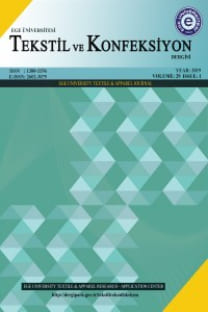ANALYSIS OF ADDED VALUE CREATION PROCESS IN READY-MADE CLOTHING SECTOR: "TURKISH CASE"
HAZIR GİYİM SEKTÖRÜNDE KATMA DEĞER YARATMA SÜRECİNİN ANALİZİ: "TÜRKİYE ÖRNEĞİ"
___
- 1. Çoruh, E.,2010, "Production System Approaches for Readymade Garment Industry", Journal of Textiles and Engineers, 17, pp. 11-19.
- 2. Alaca, H., 2010, Value Chain Analysis With Value Stream Mapping Tools: White Good Industry Application, M.Sc. Thesis, Istanbul Technical University, Institute of Science and Technology, Department of Industrial Engineering.
- 3. Yayar, R., Çoban, M.N., 2012, "Data Envelopment Analysis Approach to Measure Activities of ISO 500 Firms: Weaving And Clothing Industry", Niğde University Faculty of Economic and Administrative Sciences Journal, 5, pp.165-180.
- 4. Koca, M., 2010, The Evaluation of Manufacturing Industry Sectors in Turkey as of The Value Added They Create, M.Sc. Thesis, Istanbul University, Institute of Social Sciences, Department of Economics, Istanbul.
- 5. Akbaş, H. E., 2008, The Effects of Value-Chain Analysis on Product Costs in Industrial Companies and A Case Study, Ph.D. Thesis, Marmara University Institute of Social Sciences, Department of Business Administration, İstanbul.
- 6. Savcı, M., 2012, Value Chain Analysis of Product Costs in Tea Companies, Ph.D. Thesis, Kocaeli University Institute of Social Sciences, Department of Business Administration Kocaeli.
- 7. Atılgan, T., 2006, "The Value Chain in Textile and Apparel Sector and Their Economical Influences", Journal of Textile and Apparel, 16, pp. 260-270.
- 8. Eraslan, İ. H., Helvacıoğlu Kuyucu, A.D., Bakan, İ., 2008, "Evaluation of Turkish Textile and Clothing Industry by Value Chain Method", Afyon Kocatepe University, Faculty of Economic and Administrative Sciences Journal ,10, pp. 307-332.
- 9. Kırım, A., 2004, Smart Purple Cow, Book Of Differentiation Your Business, Sistem Publishing.
- 10. Sefai, M.S., 2011, Application Of Supply Chain Analysis and Improvement Methods to A Ready-To-Wear Retailing System, M.Sc. Thesis, Bahçeşehir University, Institute of Science and Technology, Department of Industrial Engineering. Department of Supply Chain and Logistic Management, Istanbul.
- 11. Kurtoğlu, Ö., 2009, Analyzing The Suitable Production and Quality Control Systems for the Stages of Collection Preparation, M.Sc. Thesis, Ege University Institute of Science and Technology, Department of Textile Engineering, Izmir.
- 12. İşbilen, A., 2005, In The Face of Design Concept of the Global World in Apparel, Competitiveness of Burdur's Regional Dresses, 1st Burdur Symposium.
- 13. Web Journal, 2015 http://www.dergil.com/tr/dergi/mart-nisan-2013/tedarik-zincirinde-yenilikci-bakis-acisi/440.aspx Access date: June 2015.
- ISSN: 1300-3356
- Yayın Aralığı: 4
- Yayıncı: Ege Üniversitesi Tekstil ve Konfeksiyon Araştırma & Uygulama Merkezi
ANALYSIS OF KNITTED FOOTWEAR LININGS FOR DIABETIC PATIENTS
Nida OĞLAKCIOĞLU, Hüseyin KADOĞLU, Arzu MARMARALI, Mirela BLAGA, Ramona CIOBANU, Aura MIHAI, Mariana COSTEA, Gözde ERTEKIN
SERICIN REMOVAL FROM SILK FIBERS WITH ECO-FRIENDLY ALTERNATIVE METHODS
Tuba TOPRAK, Pervin ANİŞ, Gökşen ÇAPAR, Eyüphan YENER
TEKSTİL TERBİYESİNDE NANO BOYUTTA KİTOSANIN YEŞİL UYGULAMASI
HAZIR GİYİM SEKTÖRÜNDE KATMA DEĞER YARATMA SÜRECİNİN ANALİZİ: “TÜRKİYE ÖRNEĞİ”
B. BİLGİLİ, F. KARADEMİR, E. BOZACI, E. ÖZDOĞAN, H. AYHAN, F. AYHAN
TÜRK TEKSTİL VE KONFEKSİYON SANAYİLERİNİN DOĞRUSAL OLMAYAN DİNAMİKLERİNİN ANALİZİ
İsmail Onur BAYCAN, Gözde YILDIRIM
R. A. ANGELOVA, E. GEORGIEVA, M. KYOSOV, P. STANKOV
Jeyakodi MOSES, - VENKATARAMAN
PASTAL PLANI VERİMLİLİĞİNİ ETKİLEYEN FAKTÖRLER İLE İLGİLİ BİR ÇALIŞMA
